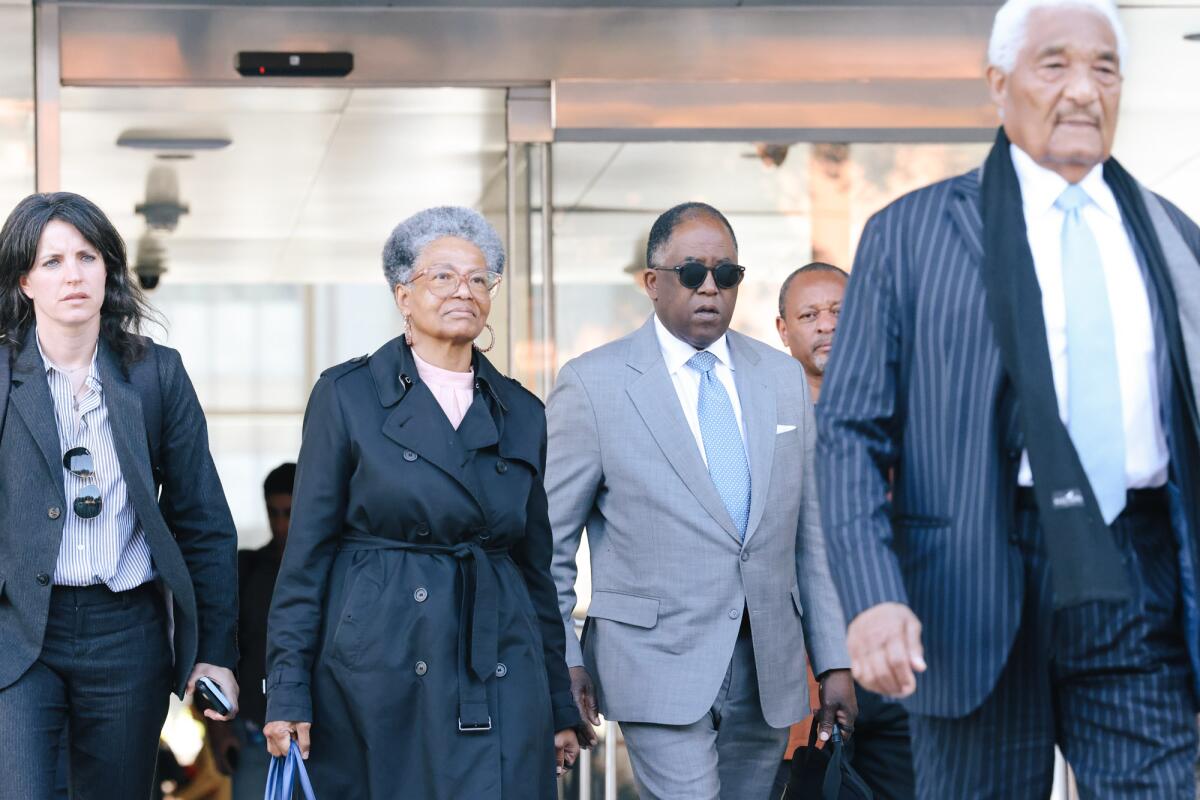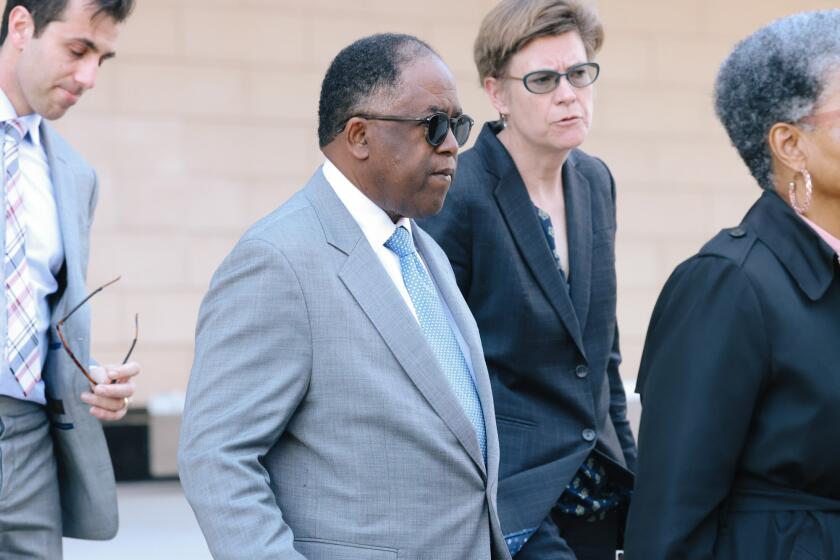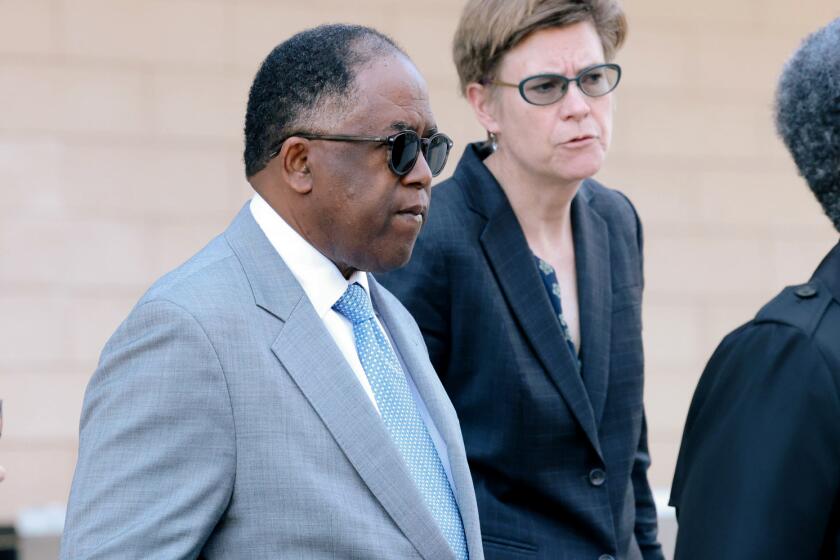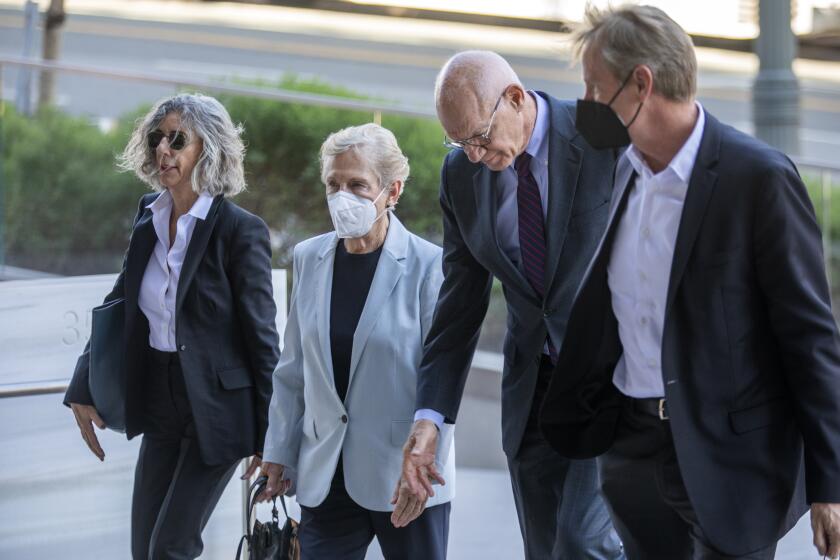Mark Ridley-Thomas sentenced to 42 months in prison

- Share via
A federal judge has sentenced Mark Ridley-Thomas, once a towering figure in Los Angeles politics, to 42 months in prison, marking a devastating coda to his long career as a local power broker and advocate for civil rights and racial equity.
The sentence was issued Monday morning by U.S. District Judge Dale Fischer, who presided over Ridley-Thomas’ criminal trial in March. In addition to the 3½-year prison term, the former politician was fined $30,000 and will be subject to three years of supervised release.
“Ridley-Thomas has committed serious crimes, has not accepted responsibility and has shown no remorse,” Fischer said. “There is simply no justification for monetizing one’s office.”
Ridley-Thomas, 68, had asked the judge to spare him any prison time and instead sentence him to probation and other alternatives to incarceration. Federal probation officials recommended 18 months in prison. Public corruption prosecutors at the U.S. attorney’s office in L.A., meanwhile, had requested a six-year term.
Fischer and the prosecutors both said the length of Ridley-Thomas’ sentence should send an unequivocal message that public corruption has serious consequences, with the judge remarking, “The entire community has been victimized by the defendant’s crimes.”
Jurors had convicted Ridley-Thomas of seven felonies — bribery, conspiracy, four counts of honest services wire fraud, and one count of honest services mail fraud — in a scheme in which he extracted benefits from USC for himself and his son while on L.A. County’s powerful Board of Supervisors. The jury acquitted Ridley-Thomas of 12 other charges related to a scholarship and a professorship that his son, Sebastian, received from USC.
“This was not a mistake,” said Fischer, who was appointed by George W. Bush in 2003. “He has a PhD in social ethics. He knew it was wrong.”
Before the sentence was handed down, Ridley-Thomas apologized to his wife, sons, daughter-in-law and grandchildren “whose lives have been disrupted and traumatically impacted.” He told Fischer, as well as the roughly 100 people packed into the courtroom, that while he regretted his conduct, he did not break the law.
“This case exists somewhere between what is clearly legal conduct on one end, and clearly illegal conduct on the other,” Ridley-Thomas said. “While I definitely disagree as to whether I crossed that line into illegal conduct, I acknowledge with clarity where I belonged was at the end of the spectrum where there would be little, if any, question of even the appearance of unlawfulness.”
Ridley-Thomas and his allies have steadfastly asserted his innocence. Supporters have accused prosecutors and the FBI of dishonesty and overreaching; suggested anti-Black racism as a motive in the case; and publicly questioned the foreperson’s account of how jurors reached a guilty verdict.
In court on Monday, Assistant U.S. Atty. Lindsey Greer Dotson categorized Ridley Thomas’ actions as “boardroom corruption” — a more “polite” and “sophisticated” kind of corruption that “is very hard to root out,” versus “back alley corruption” involving sordid cash bribes, as in recent prosecutions involving L.A. City Councilmembers Jose Huizar and Mitch Englander.
After the nearly two-hour hearing, the scores of supporters who filled the courtroom and a second, overflow room appeared somber and stunned, with some wiping away tears.
One of Ridley-Thomas’ twin sons, Sinclair, told reporters that his family was “deeply disappointed in the current state of affairs.”
“It is a sad day for everyone,” said defense attorney Galia Amram. She said her client “regrets deeply that his actions caused anyone to think that he crossed the line” and that he would pursue an appeal. “While we respect the jury’s decision at trial and the court’s decision today, there are significant legal issues that need to be addressed on appeal.”
Prosecutors want to put veteran Los Angeles politician Mark Ridley-Thomas in federal prison for six years over USC corruption case
Prominent public intellectual Cornel West, who sat in the front row during the hearing, described Ridley-Thomas as his “dear brother for life” and characterized him as “one of the greatest public servants in the history of this state.”
Ridley-Thomas’ conviction has stained the legacy of a politician whose nine successive election victories made him a formidable council member, state assemblyman, state senator, county supervisor and then a council member once again. He championed other Black politicians, forming a political machine that stretched from Sacramento to L.A. to Washington, D.C. His name has graced a wellness center, a high school health center, a youth facility and a bridge spanning La Cienega Boulevard.
In advance of his sentencing in the 1st Street U.S. Courthouse, more than 100 of Ridley-Thomas’ friends, allies and family members had pleaded for mercy and attested to his character.
Sheila Kuehl, a retired L.A. County supervisor, commended her former colleague as “a good and honorable man” who “lived a model life” before his corruption case.
Jackie Goldberg, president of the board of Los Angeles Unified School District, wrote on official letterhead that Ridley-Thomas was “a warrior for social justice.” State Sen. Steven Bradford (D-Gardena), also on official letterhead, called his friend “a compassionate servant leader.”
That portrayal sharply departed from that of federal prosecutors, who described Ridley-Thomas as the architect of a “shakedown” in which he sought to “enrich his family.”
“He capitalized on the power of his elected office for personal gain. He lied, cheated, and deceived, repeatedly,” prosecutors wrote in their sentencing memo. “He was uniquely positioned to serve his constituents. Instead, he served himself.”
Jurors agreed that Ridley-Thomas acted corruptly when he sent $100,000 from a campaign committee to USC, then directed Marilyn Flynn, the dean of the university’s social work school, to quickly transfer the funds to a nonprofit run by his son. At the time, Flynn was pressing Ridley-Thomas for help renewing a coveted county contract. Ridley-Thomas voted on that renewal a few months later.
Veteran L.A. County politician Mark Ridley-Thomas is found guilty of federal corruption charges related to benefits his son received at USC.
Prosecutors offered evidence that Ridley-Thomas’ dealings with USC were partly motivated by shielding his son and himself from scandal. Sebastian Ridley-Thomas had served in the state Assembly but resigned abruptly in late 2017 while facing a confidential sexual harassment investigation. Prosecutors argued that the benefits from USC were a way to give his son a “landing spot” that preserved the family’s political brand.
“The many letters I received show that his service to the community has been truly extraordinary,” Fischer said at the sentencing hearing. But, she said, the good works did not come close to justifying what Ridley-Thomas and his lawyers sought: a probation sentence that avoided prison.
Any lesser sentence “would be an invitation to other public servants to betray the trust the public places in them,” Fischer said.
Flynn, Ridley-Thomas’ co-defendant in the case, was sentenced this summer to three years of probation. She had pleaded guilty to one count of bribery, provided incriminating evidence to federal prosecutors, and expressed regret and contrition.
Ridley-Thomas, in contrast, proceeded to trial on all 19 charges against him.
Marilyn Flynn, the former dean of USC’s social work program who admitted to bribing Los Angeles County Supervisor Mark Ridley-Thomas in exchange for his help securing the renewal of a county contract, was sentenced Monday to 18 months of home confinement.
In going after Ridley-Thomas, a team of federal prosecutors headed up by Assistant U.S. Atty. Mack Jenkins relied on reams of evidence from USC and from Ridley-Thomas’ AOL email inbox.
The correspondence between Ridley-Thomas and Flynn showed the duo working to funnel money to Ridley-Thomas’ son’s nonprofit in ways that masked the original source.
Ridley-Thomas, for example, sent a $100,000 donation in May 2018 to USC, with a letter telling Flynn that “these funds can be used at your discretion.” The following day, however, Ridley-Thomas emailed Flynn with bank wiring instructions for how the $100,000 should be spent. “At this point it is necessary to act with dispatch,” he wrote.
When Ridley-Thomas learned from Flynn that the money was en route to his son’s nonprofit, he told her, “I repeat: You’re the best!!!”
Around the time that the money was funneled through USC, Flynn told a colleague that she did a “favor” to secure the renewal of a remote mental health contract that USC had obtained from L.A. County.
The circuitous flow of money from Ridley-Thomas’ ballot committee, to USC and to his son’s nonprofit was just one piece of a broader corruption scheme alleged by prosecutors. Ridley-Thomas was also accused of using his elected post to secure admission for his son to USC, along with a full scholarship and a professorship — but jurors acquitted him of counts that were directly related to these benefits his son received.
Shortly after Ridley-Thomas was indicted in 2021, he was suspended from his post on the L.A. City Council, where he represented the 10th District, stretching from Koreatown to South L.A. With his conviction, he permanently lost his seat.
Throughout his criminal case, several longtime donors and allies gave money to two defense funds to subsidize his legal bills. He raised more than $1.5 million from a combination of outside donors and personal loans.
Ridley-Thomas must report to prison by Nov. 13, a week after he turns 69.
More to Read
Sign up for Essential California
The most important California stories and recommendations in your inbox every morning.
You may occasionally receive promotional content from the Los Angeles Times.


















